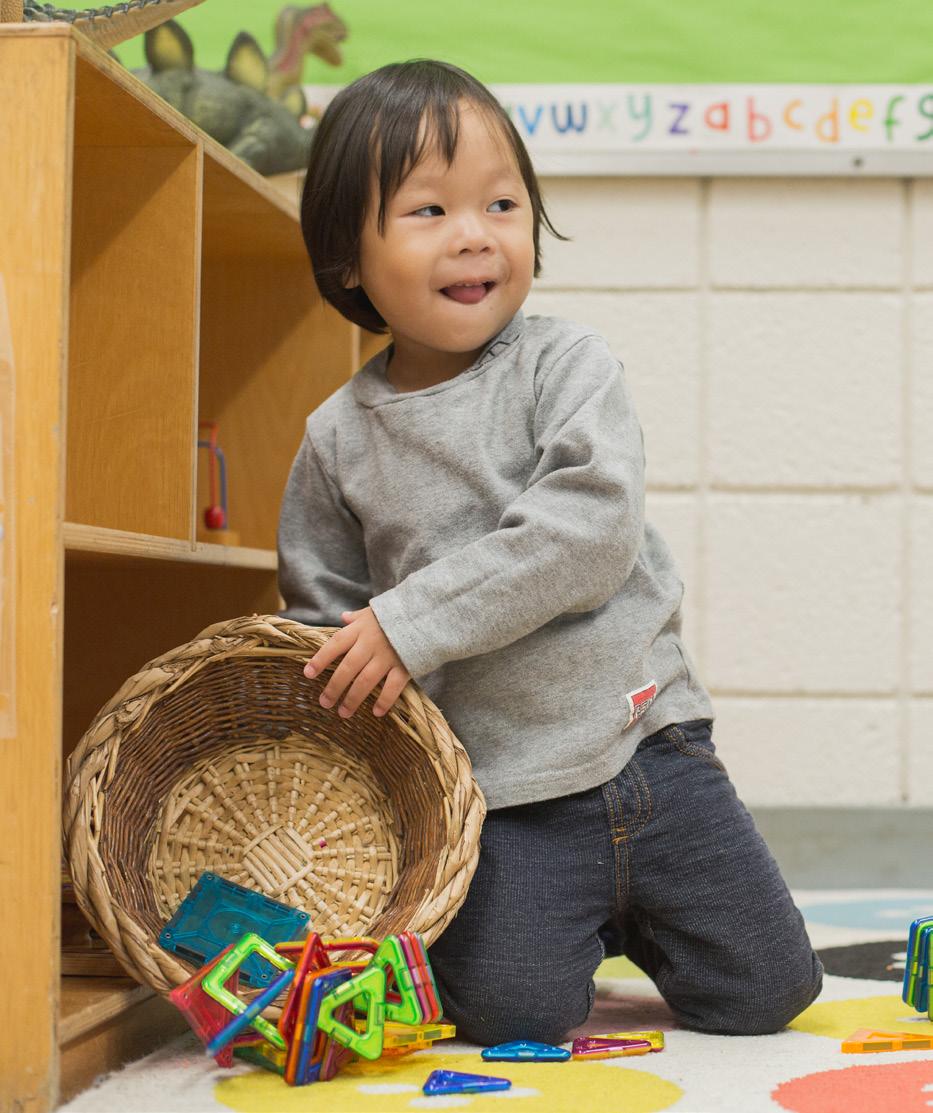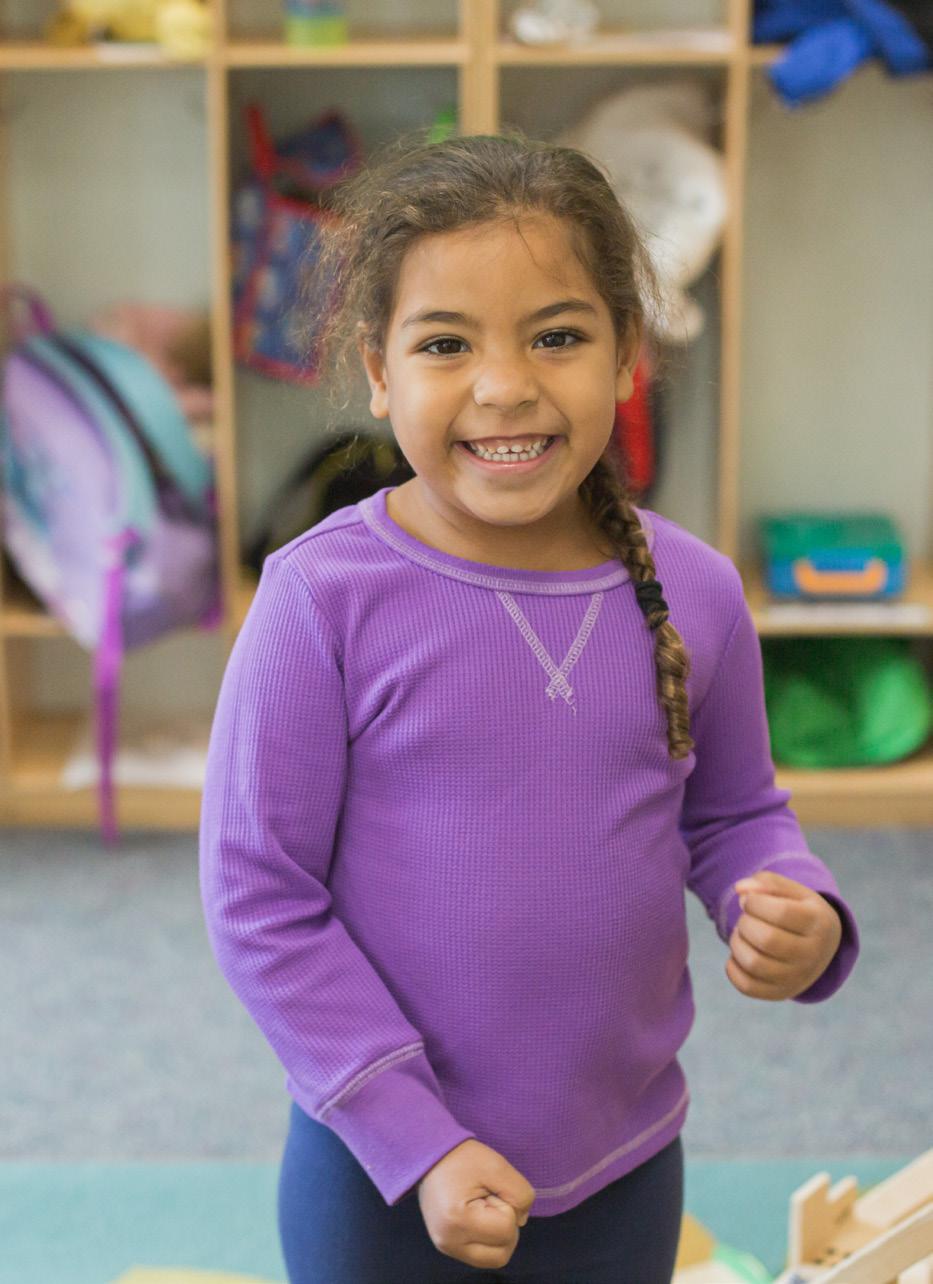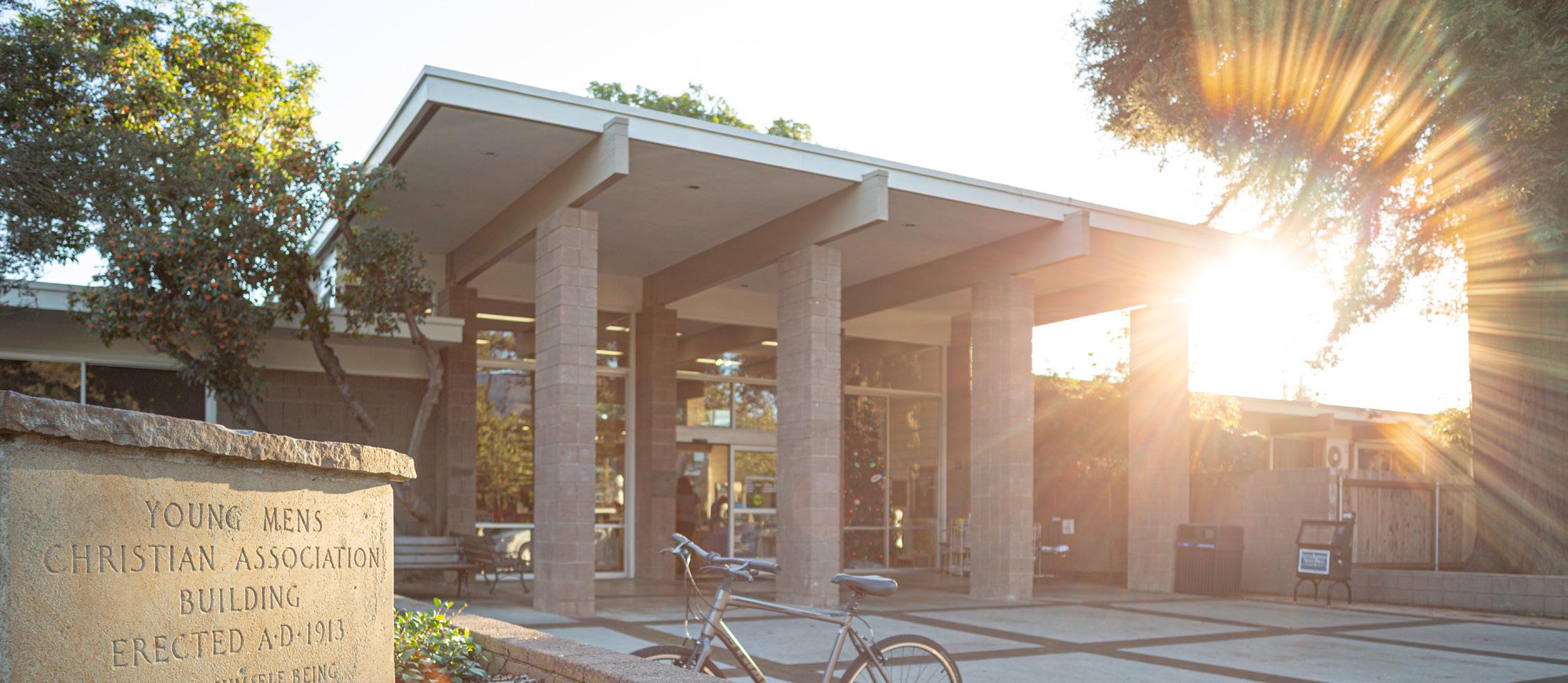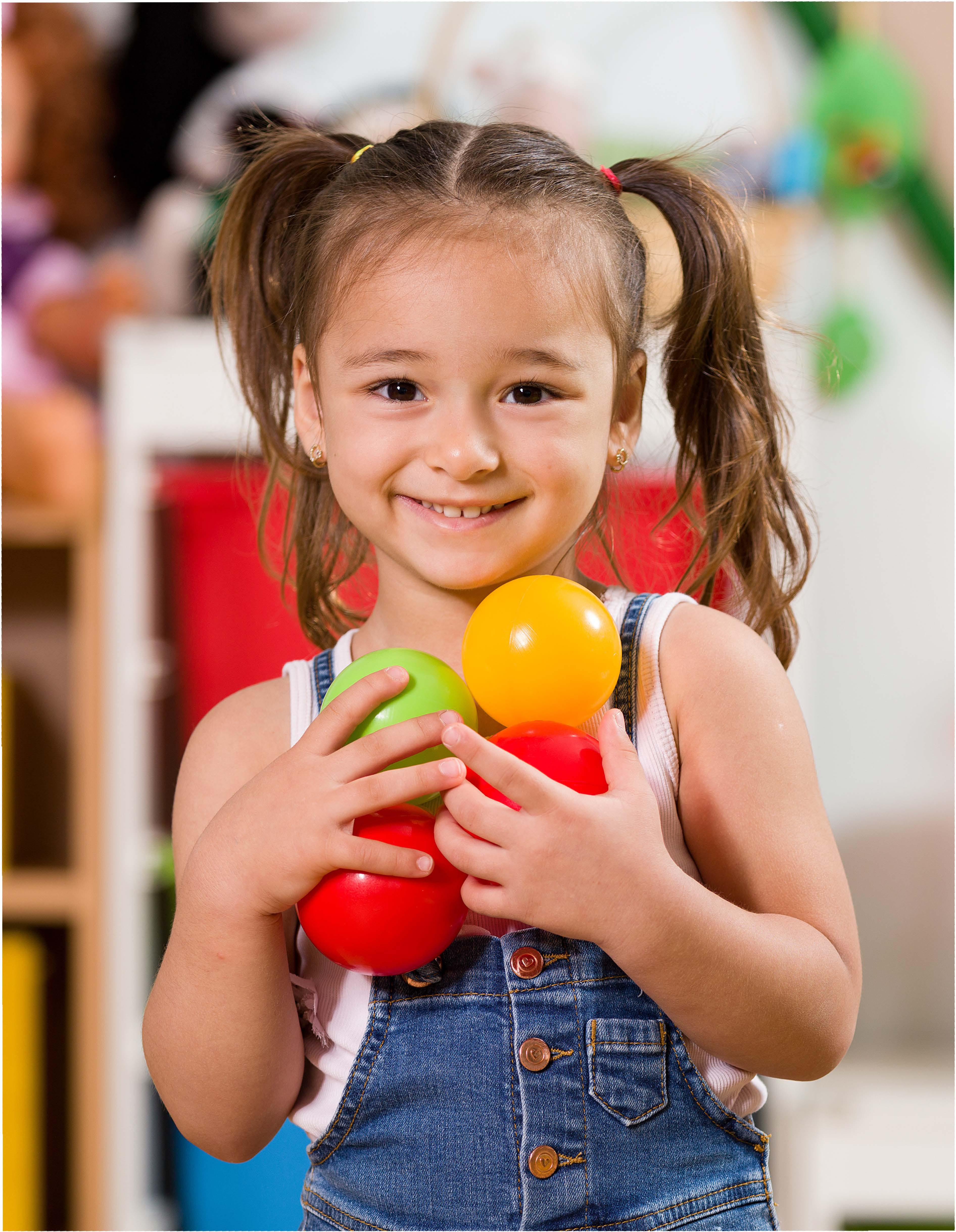
INSPIRE • CREATE • EXPLORE Preschool Program The Channel Islands YMCA
The most formative time in a child’s development occurs between birth and five years old. For example, our capacity to develop vocabulary, a lifelong communication skill, is largely developed by the time we reach age five. This is why we put so much careful planning into our program and staff. The time children spend in preschool is used to develop a foundation for lifelong learning.
At the Y, we know that parents have important choices to make in regard to their child’s education. The kindergarten we knew as kids has become more academic and the skills needed to thrive more crucial. This means that it is more important than ever for parents to ensure their child is on a good developmental footing, and the best way to do this is through quality preschool experiences like the YMCA.
We believe that children learn best through structured and unstructured social and environmental interactions, especially in play. A childs character education is just as important as an academic education and instill the values of citizenship, caring, fairness, respect, responsibility, and trustworthiness into their daily language and actions. We believe in focusing on the whole child and supporting the family and community that surround them.
At the YMCA we hope that our preschool will feel like an extension of family for your children, filled with encouragement and exceptional care. We hope that you as a parent will have peace of mind that your child is in a healthy and enriching environment.



1
SAFETY FIRST
At the YMCA your child’s safety is a top concern. We operate under strict safety guidelines related to nutrition, health, behavior management, classroom environment, and more..
Exclusion from the program for health concerns - The Center requests that parents restrict their child/children from attending if any of the following conditions are present..
•
• • • • •
A temperature has occurred within a 24-hour period. A contagious illness/infection has been diagnosed or is suspected. Vomiting or diarrhea within 24 hour period. Consistent or phlegm cough. Pink or red rimmed eyes, crusted, goopy or dried shut eyes, upon waking up. Rash of unknown origin or symptoms of chicken pox or head lice.
In order to return to school, your child must be symptom free, or on antibiotics for at least 24 hours. Children who are sent home with a fever, vomiting or diarrhea will not be accepted back to school the next day. Children must stay home 24 hours after these symptoms have stopped. Exceptions to this rule will be made with a physician’s written notice.
Health Checks - The teachers will do Health Checks on each child upon arrival. If an outbreak occurs Health Checks will be given every day until outbreak is contained. Parents are required to stay until the Health Check has ended. Any sign of illness indicated above will require the child to be dismissed from the program until necessary steps are taken to insure the child’s is healthy and ready for school.
Head Lice - Children who have lice will be sent home and not allowed to return until every nit is out of the infested area. Nits are yellow/white or rust colored oval bead-like insects that can be found on strands of hair and scalp. Even if they appear to be dead, meaning, not clinging to the hair, your child may not return to school if there are any signs of nits. There is NO EXCEPTION to this policy. This is to ensure the health and safety of your child and other children in the program.
Injury – If a child is injured at school, first aid is provided and an “ouch” report is sent home to the parents. Should there be a head, face or neck injury, first aid is given and parents will be called. An incident report will be filed. If the injury is serious or life threatening, first aid will be given and paramedics will be called, parents will be notified simultaneously and the child will be transported to a local hospital if necessary. A staff member will accompany the child. An incident report will be filed.
HEPA Standards – The Partnership for a Healthier America (PHA), and the Y has committed to adopting new standards for nutrition and physical activity in our early childhood, afterschool and camp program. The Healthy Eating and Physical Activity Standards or HEPA standards are used in conjunction with daily programming in order to insure the overall well-being of the participants in and out of our care.
Child Abuse Prevention Procedures - All teachers have received training in child abuse prevention procedures and are mandated reporters.
2
Preschool Childcare Overview
YMCA childcare provides opportunities for children to learn, grow and thrive as they make their way to kindergarten. Our program supports the cognitive, social-emotional, physical, language and literacy development of all children.
•Our Philosophy: Our focus is to build children’s confidence, learning capacity, kindergarten readiness, creativity and critical thinking through an immersive and collaborative learning environment. Through participation in the Y, children will discover the what, why, and how of the world around them through structured instruction and learning through play. We develop and encourage character education in all interactions and learning environments.
•Oversight: Our programs are licensed by the Community Care Licensing Division of the State of California. Our programs must comply with outlined regulations in the areas of the physical environment and safety, staff qualifications, supervision and staff/child ratios, administrative record keeping requirements, programs and activities, food and nutrition, and more.
•Outdoor Learning Environment: Studies show the importance of students being outside and interacting with the natural world. The YMCA promotes 3 ½ hours a day of outdoor learning in full-day programs. The outdoor classroom lends itself to students working on motor skills, socialization, and cognitive development. The natural landscape and planned activities help children learn through play and exploration.
•Quality Staff: Each location is supervised by a Site Director who is responsible for the overall operations of the program and is supported by additional staff based on the needs and size of the program. All staff meet or exceed education and experience requirements outlined by their governing body (i.e. Community Care Licensing). All staff has college instruction in Early Childhood Education, completed background screening, finger prints, and over 40 hours of specific health and safety training (i.e. CPR, Child Abuse Prevention, and Supervision) at their time of hire.
•Enrollment & Registration: After registration at the YMCA or online, enrollment forms are completed on ePACT Network, a digital platform for collecting children’s emergency and medical information. Fees are based on enrollment rather than attendance. All payments are due weekly and made through electronic funds transfer on Fridays for the upcoming week.
•Financial Assistance: Annually, we receive support from hundreds of members, donors, community leaders, and businesses who believe in our purpose, investing in youth and families. Funds are distributed to families with a financial need in our community.
•YMCA Membership: As an added value to the preschool experience, all enrolled families receive a free fitness facility membership to the YMCA. Having a fitness membership will allow your family to get connected to the YMCA community and work on fitness as a family.
3
Importance of Play for Preschoolers
There are times in the program for both teacher and child lead activities. Both have value to the social, emotional, physical, and cognitive development of children. What are children doing when they are playing?.
Core Areas
•CREATIVE: Art projects provide an opportunity for expression allowing children to express thoughts and feelings that they may not be prepared to verbalize in addition to, providing a chance to explore colors, shapes, and textures.
•MUSIC: Through singing and musical experiences such as experimenting with patterns, sounds, and tones, using musical instruments, and recognizing basic pitch and rhythm, children develop auditory skills and build an appreciation for music. A wide variety of music also exposes children to the diversity of music and culture.
•DRAMATIC PLAY: provides an opportunity for role-playing, socialization, dramatization, problem solving, practicing adult skills, and behavior.
•MANIPULATIVES: These table top cognitive games foster perceptual skills, hand-eye coordination, fine motor control, and reinforce basic skills and concepts.
•MOVEMENT: Increases strength, flexibility, coordination and balance. The development of large motor skills helps children orient their bodies in space which increases body control, self-awareness self-esteem, and confidence
•SENSORY: Experiences are essential to the preschool child. Young children learn through their bodies. Sensory experiences encourage curiosity, exploration, and discovery. They may also offer an acceptable outlet for feelings. Sensory play uses a variety of materials such as water, sand, recycled items, and natural items (we do not use food for sensory, as some children come from homes that are food challenged or children can be allergic.).
•OUTDOOR PLAY: Improves and develops large motor skills and promotes physical health. Outdoor play also fosters enjoyment of and sensitivity to nature.
•STORYTIME: Reading aloud to children expands their knowledge of language and improves their vocabulary as well as develops their desire to read and encourages reading comprehension.
•SOCIAL SKILLS: Building social skills strengthens communication, trust and empathy by helping children learn to play together, s olve problems, take turns, share and appreciate eachother’s accomplishments.
4
Sample Schedule
Schedules will vary depending on program times, locations, and available plan options. Below is a sample of what your child may experience at one of our centers.

Drop-off and pick-up times vary depending on locations.
• Open - 9:15am
•9:15am - 9:30am
•9:30am - 10:00am
•10:00am - 11:00am
•11:00am - 11:45am
•11:45am - 12:30pm
•12:30pm - 1:00pm
• 1:00pm - 3:00pm
•3:00pm - 3:30pm
• 3:30pm - 4:30pm
• Closing
Drop off & free choice activities
Circle time and snack
Bathroom break
Planned activity
Outside play
Bathroom/Lunch
Outside play

Nap/Resting time
Bathroom/Snack
Planned or free choice activities
Pick-up
5


Locations Montecito Family YMCA 591 Santa Rosa Lane Montecito, CA 93108 • 805.969.3288 • MO.Info@ciymca.org •Childcare Director: Esther Reitmeier • esther.reitmeier@ciymca.org Santa Barbara Family YMCA 36 Hitchock Way Santa Barbara, CA 93105 • 805.687.7727 • SB.Info@ciymca.org •Childcare Director: Channing Hogue • channing.hogue@ciymca.org 6 9:15-4:30PM M-F 8-5:30PM M-F












